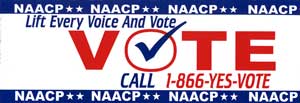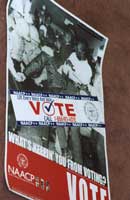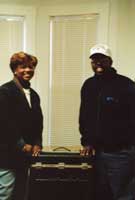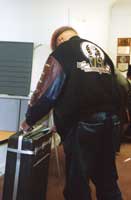|
Voting for
Change: Oakland’s Struggling NAACP Faces Election Anxieties of its
Own
By Orquedia Price
Photos by Rachelle Jones
OAKLAND, Nov. 26--Diane Lewis, a city attorney, had no confusion at all
about the ballot she marked up yesterday in the downtown office of the
Oakland NAACP. She was voting, she said, for change.
"I see this as an
opportunity for the NAACP to regain leadership and make a statement in
Oakland," Lewis said as she stepped out of the voting booth and stuffed
her blue ballot form into the box on the floor. "I would like the
organization to take a more visible position on issues in Oakland and
take a leadership role."
While it is the oldest branch
in the Bay Area, the Oakland branch of the National Association for the
Advancement of Colored People has been plagued in recent years by apathy
and dwindling membership participation. Lewis was among the few dozen
people who paid enough attention to this year’s local NAACP election
to bother coming downtown to vote. A poster that read, "NAACP Vote
Here Today!" hung outside the office, but only 45 out of 2,000 members
showed up—a prime illustration, some NAACP members said, of what
has troubled them about the organization’s decline.
"We haven't done anything for civil rights in a long time,"
said Viola Wims, a retired real estate broker who has served for 50 years
on the Oakland NAACP board. "I just never thought it would change
to what it is."
The Oakland branch, which organized
in 1913, was the first NAACP chapter in Northern California. It represented
the cities of San Francisco, Oakland and Berkeley. The branch participated
in the national NAACP campaign to eliminate Jim Crow laws and to support
anti-lynching legislation. The Oakland NAACP had an important impact on
the civil rights struggle in California and worked to exert political
influence on behalf of blacks, who by the 1970s had become the largest
racial group in Oakland.
But the branch has struggled to gain the relevance it had when the civil
rights movement energized the organization and its members. "They
do a lot of talking about getting things done, but I haven't seen anything
recently that they have done that has benefited anyone in Oakland,"
said Norris Moore, an Oakland resident and vocational school recruitment
director who said he has seen no reason to join the NAACP. "A lot
of rhetoric has spouted, but I would like to see tangible results."
One source of contention in
recent years has been the presidency of Shannon Reeves, who attracted
considerable attention when he was elected in 1996 at the age of 27, making
him the youngest leader in the history of the Oakland NAACP. Reeves said
he wanted to create an energized NAACP, with more aggressive public advocacy
for civil rights. "Everyone voted for him," said Vilma Chavis,
branch secretary of six years and business owner. "Members were excited.
People in the whole city were energized by him. He was sought after by
civic organizations and churches all the time. They wanted him to speak
at various city functions."
But the NAACP is an officially nonpartisan organization, and Reeves annoyed
many of the organization's members when he became a high-profile Republican
during this year's tight presidential campaign. When George W. Bush was
celebrating his Super Tuesday victory at the Republican National convention
this summer, many black voters were disturbed when Reeves appeared on
national television, his Oakland NAACP President label on the screen,
in support of the Texas governor.
Complaints about this appearance were a part of a strongly worded ten-page
members’ complaint about Reeves to national NAACP president Kweisi
Mfume. The complaint said Reeves was pushing a political agenda that was
not in the best interest of blacks in the community. According to Wims,
Mfume replied: "If you want him out, you should increase your membership
in the branch and vote him out."
Reeves also upset his own membership by supporting John Russo, a white
Oakland City Council member, in Russo’s bid to become Oakland city
attorney. Many blacks were supporting incumbent Jayne Williams, who is
African American. In September, Russo barely defeated Williams to become
the new city attorney. Reeves "got on television and gave the impression
that the NAACP was supporting Russo," said Wims. "We asked him
to hold a press conference saying that he is supporting Russo, and not
the NAACP. But he never did."
Reeves, an Oakland native, said he had endorsed Russo because the two
were longtime friends. But some members said they believed Reeves was
not paying enough attention to NAACP business and was using his civil-rights
position merely to advance his political agenda.
Reeves, who declined to run again after two terms as president, has had
his NAACP supporters, who say he boosted membership, refurbished the organization’s
main office, and involved more young people. Reeves said he has raised
nearly a million dollars, the organization is in the strongest financial
shape it has ever been in, and that the next president can take the local
branch to the next level.
That task will go to Andrea Ford-Roberts, who won election yesterday to
become the first woman president of the Oakland branch in nearly 20 years.
Roberts, an Oakland deputy city attorney, said she decided to seek office
because members were complaining about the way the branch was being run.
She said that for too long "many longtime members were not being
kept informed" about monthly meetings because they had not received
mailings—including the notice about the Nov. 19 election.
"People came to me because they felt they were not being included,"
she said. "Members said they weren't given any information, and that
they felt completely disenfranchised."
Reeves disagreed with Robert's comments. He said people were not informed
and involved because they didn't attend meetings. "When you come
to meetings, you find out what's going on," Reeves said. "If
you don't come, then you don't want to know. Information is available
and there is plenty work to be done."
Roberts said that once she takes over the volunteer position, her major
task will be attracting 100 new members and organizing a "round table
discussion to understand what the issues are in Oakland."
The new president said she plans to work with Oakland Mayor Jerry Brown.
"A lot of changes have impacted people of color," Roberts said.
"I want to get in and have a discussion with him, so that he knows
the NAACP will be a powerhouse in Oakland."
Roberts said she is concerned about the city's plan to redistrict Oakland
and that she plans to appoint an NAACP committee to monitor the redistricting
effort. The demographics of Oakland have changed so much in the last five
years that the city could redistrict in such a way that "there would
not be a single district where there is a majority of black people to
vote," she said.
Roberts said she also plans to also create a youth center in West Oakland
to help youths who don't have access to computers, and to start an educational
program to teach youth about African American history.
"I would like to see the program integrating older NAACP members
with young people," she said. "Older NAACP members would tell
them what has happened in the last 40 to 50 years, so they don't forget
why it is so important to vote. I want them to know we fought for the
right to vote." Over the next two years Roberts said she plans to
increase the number of black registered voters in Oakland.
Roberts, 47, is a New York
City native and former national vice president for a black law students
association. For the past year she has handled employment, labor, and
public housing issues the in the Oakland city attorney's office. Her work
duties have worried some NAACP members, who have privately expressed concerns
that it may be difficult for someone who works at City Hall to challenge
political or corporate forces on behalf of minorities with complaints
about bias or other issues. But Roberts said that there is "no detriment"
in selecting a city employee as president of the Oakland NAACP.
" I can do a lot by being on the inside," Robert said. "The
situations that may pose any issue would be employment issues. If I were
the city attorney, then there might be an issue."
Charles Henry, a UC Berkeley African American Studies professor who has
written extensively about black politics, said there is a need for black
leadership in Oakland. Henry said no black leaders have emerged in the
city since Oakland's last black mayor, Elihu Harris, stepped down in 1998.
"There still remains a gap of black elected officials in Oakland,"
said Henry. "But the NAACP has the opportunity to be seen as a new
form of black leadership. It depends on the role of the new president."
Former NAACP branch president William Patterson, now an East Bay Municipal
Utilities District board member, said he thinks Roberts will make sure
members are better informed and more involved with the organization. "The
new president has ways to make sure the NAACP works the way the members
want it to," said Patterson. "I think her leadership will be
different. She is not a political person, and her full attention will
be on the branch. She will help us build a strong branch and provide leadership
for Oakland."
Home
|




New
President Andrea Ford-Roberts and Old President Shannon Reeves


Guy
Williams

|

